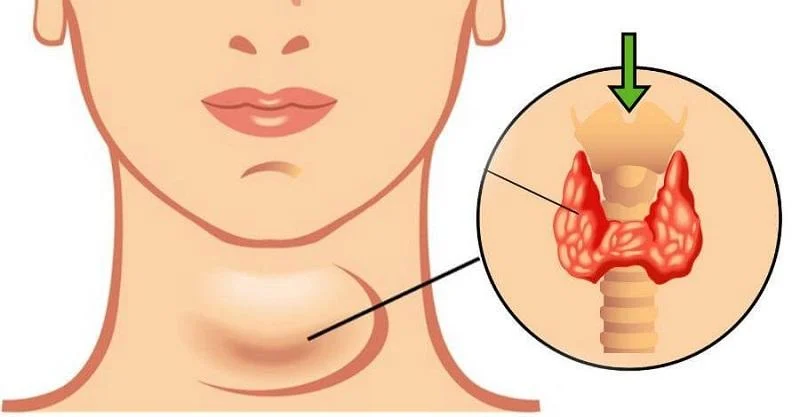Women are 2-10 times more likely to develop hyperthyroidism than men. The symptoms of hyperthyroidism are often varied and can cause serious complications if not treated properly. To better understand hyperthyroidism and answer the question of whether hyperthyroidism is dangerous, follow the article below!
What is hyperthyroidism?
The thyroid gland is a small gland located in the front of the neck, shaped like a butterfly and protected by the skin and muscles in front, and the trachea behind.
The thyroid gland produces hormones such as Thyroxine (T4), Triiodothyronine (T3). These hormones play an important role in the growth, metabolism and development of the body. When the thyroid gland functions normally, the body’s metabolism is maintained stably. On the contrary, if there is an abnormality in the functioning of the thyroid gland, it will adversely affect the patient’s health and can be a sign of a number of dangerous diseases, including hyperthyroidism. Hyperthyroidism, also known as hyperthyroidism, is a syndrome that occurs due to the overactivity of the thyroid gland, leading to the production of thyroid hormones exceeding the body’s needs and increasing the concentration of thyroid hormones in the blood. This causes symptoms that affect the health and daily activities of the patient.

Is hyperthyroidism dangerous? This is a question of many patients.
Symptoms of hyperthyroidism
The cause of hyperthyroidism is due to overactive thyroid nodules and can also originate from a number of thyroid-related diseases such as thyroiditis, goiter, Graves’ disease, etc. At that time, thyroid hormones are secreted too much, causing all body functions to increase activity with symptoms such as:
- Patients are afraid of heat: People with hyperthyroidism are often afraid of hot weather and high temperatures because the disease increases body temperature. This makes the patient’s body always hot, tired and sometimes causes dehydration.
- Increased heart rate: Patients feel most clearly that the heart beats faster and stronger in the chest. When the disease progresses, it can cause chest pain and difficulty breathing.
- Increased sweating: The disease disrupts the activity of sweat glands combined with high body temperature, causing patients to sweat frequently even when resting and not exercising.
- Diarrhea: The condition of increased intestinal motility causes diarrhea and prolonged dehydration.
- Weight loss: People with hyperthyroidism still have a normal diet, sometimes the amount of food they take in is more than before but their weight still cannot increase. Their weight even drops rapidly in a short time. The cause of this phenomenon is that the nutrients taken in are used for excessive metabolic activities of the organs, leading to a lack of energy for other needs of the body.
- Changes in temperament: Hyperthyroidism also greatly affects the mood and temperament of the patient. Making them often worried, tired and angry for no reason.
- Goiter condition: The gland is located in the front of the neck, so when the thyroid gland is enlarged due to overactivity, it will cause the front of the neck to swell and lead to goiter.
- Hand tremors: Hyperthyroidism causes uncontrollable hand tremors with small amplitude but fast frequency. Therefore, it is difficult to distinguish this symptom with the naked eye. To identify the symptoms of hand tremors due to hyperthyroidism, place a piece of paper on the back of your hand and keep it on the table, the vibration of the paper will clearly show this condition.
- Sleep disorders: Patients with hyperthyroidism often have difficulty falling asleep, sleep lightly, are easily awakened and sleep is often short.

Uncontrolled weight loss in a short period of time is a symptom of hyperthyroidism.
Is hyperthyroidism dangerous?
Thyroid hormones are very involved in the body’s activities in many organs. Therefore, when any problem occurs in this organ, it will greatly affect the health of the whole body.
So is hyperthyroidism dangerous? The answer is yes. If the disease is not detected early and not treated promptly according to the correct regimen, the patient will experience dangerous complications such as:
Cardiovascular complications: One of the most common and obvious symptoms in patients with hyperthyroidism is rapid heartbeat. If this condition persists and is not treated early, it will cause serious heart diseases such as arrhythmia, atrial fibrillation, heart failure or stroke…
Osteoporosis: The condition of overactive thyroid hormones will hinder the absorption of calcium and reduce bone density. Therefore, the patient is susceptible to osteoporosis and bone fractures. Therefore, increasing calcium supplementation and bone strength is very important in the prevention and treatment of osteoporosis in patients with hyperthyroidism.
Thyroid storm: When thyroid hormone levels increase too high and quickly, causing the symptoms of the disease to suddenly become severe. At this time, if not treated promptly, the patient’s life may be in danger.
Eye complications: If not treated well, hyperthyroidism will directly affect the eyes and malignant exophthalmos is the most serious condition. At this time, the patient’s eyes will bulge, become larger, have reduced vision, be sensitive to light and often watery eyes…
In the treatment regimen for hyperthyroidism, in addition to reducing thyroid and hormone activity, prevention of possible complications, especially for the cardiovascular system, needs to be strictly controlled because this is a common complication and can endanger the patient’s life.

Heart failure is the most dangerous complication for people with hyperthyroidism.
How to effectively prevent hyperthyroidism
In the early stages of hyperthyroidism, the symptoms are often not serious and unclear, so they can easily be confused with other diseases. Therefore, to detect this disease early or prevent its progression, you should regularly have regular health check-ups.
In addition, prevention of hyperthyroidism also needs to be done by measures such as:
Exercise regularly: Regular exercise will help the body stay healthy and increase the body’s active resistance. When the immune system works well, it will limit the risk of antibodies mistakenly recognizing and destroying thyroid cells, reducing the possibility of thyroid disease.
Supplement with adequate iodine: Iodine is a substance that directly affects the function of the thyroid gland. Excess or lack of iodine can cause thyroid-related diseases, in which supplementing too much iodine into the body will cause hyperthyroidism syndrome. Therefore, moderate iodine supplementation is essential, especially for pregnant women and the elderly.
Reasonable diet: For the prevention and treatment of hyperthyroidism, nutritionists recommend choosing foods rich in antioxidants found in fruits such as blueberries, strawberries, etc. or in green vegetables such as kale, broccoli, etc. In addition, maintaining a diet full of nutrients from fresh sources and limiting processed foods, fried foods, or avoiding alcoholic beverages and stimulants is also essential for good health.

Regular exercise is also a way to prevent hyperthyroidism.
Thus, hyperthyroidism is a common syndrome related to the endocrine system in the body. This disease causes many dangerous symptoms and complications for the patient. Hopefully, through the above article, readers have had the answer to the question of whether hyperthyroidism is dangerous and know the methods to prevent thyroid diseases in general and hyperthyroidism in particular to always have good health.





